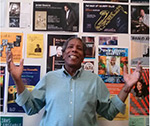 |
 Joe Major |
Emissaries from the realm of Raw Exposure convened a general assembly in the EMPAC Theater Wednesday night. Under the rubric of the Ambrose Akinmusire Quartet the delegation executed their erudite mandate by offering up an agenda of potent personal maxims. To this willing yet unsuspecting listener, Akinmusire’s trumpet, complemented by Sam Harris’s piano, projected a fearless openness, one that served as a symposium on emotional disclosure. Together with Harish Raghavan’s driven, pridefully righteous bass and drummer Jeremy Dutton’s attachment to asynchronous central nervous system time, the group formed a force field along the periphery of Akinmusire’s innermost ramparts. His compositions and trumpet craft conspired to issue dispatches in spare, direct phrases, like burnished hardwood. His lines created a poetry that toggled between meditative and expressive. Solos were monolithic protuberances, with just the ever so slight intimation of doubt. His tone was imbued with a pealing appeal, possessed of a forthrightness and clarity that was only deterred from restrained narrative by spasmodic brrppt! brrppt! brrppt! eruptions. The pangs of Harris’s piano ministrations, too, were steadily paced and ringing, until falling off into spirals of Monkish freefall. Most of the pieces were from their latest CD, “A Rift in Decorum: Live at the Village Vanguard.” Dutton was a dynamic one-timer for this evening, replacing Justin Brown. Through numbers which I believe were “Maurice & Michael (sorry I didn’t say hello),” “Moment in between the rest (to curve an ache)” and “Condor,” the quartet depicted what amounted to a diary of interpersonal relationships. In “Maurice,” Harris sounded as if the default emotional stance was circumspection and everything that followed was an unraveling, a breakthrough. In “Moment,” trumpet and piano interplay established a processional gravitas that allowed the merest glints of hope to daringly escape. Midway through a pensive Akinmusire segment there came an extraordinary suspended, extended note. Held alone aloft, its significance to the plot line suggested aggrieved lament, pyrrhic resignation, passion and articulate commitment. However one “curves an ache,” that singular marking of a sacred moment was as resolute as the closing chord in the Beatles’ “A Day in the Life.” But soon his breathy flustering and sputtering, erratic burbles and faltering honks indicated that he was engorged with anguish. Rifts were indeed developing. An invigorating respite followed with “Condor,” an ethereal tune that glided on a buoyant bass and the idyllic, lolling dalliance of trumpet and piano again. It was a shimmering retreat of peace and consolation that wouldn’t last long. All the fissures that showed hints of fracture earlier in the program came to a prophetic trailhead with the stunning finale, “Umteyo.” Realize now, that this session occurred just days after the spate of horrific demonstrations in Charlottesville, VA. Introducing the work, Akinmusire wrestled with thoughts about young players and models of protest. His implicit resolution of the dilemma was the notion of best effecting resistance through his art. What followed seemed to carry the DNA, fifty years later, of Max Roach’s “Freedom Now Suite” and Art Blakey’s “The Freedom Rider.” It was eerily regrettable revisiting those touchstones, but powerfully appropriate. The music signaled that where there may have been poise and composure, the social fabric was rent. Raghavan and Harris dramatically increased their roiling, emphatic pressure cooker cadence, repetitive and incessant, while Dutton furiously flayed away in volleys of polyrhythmic seizure as counterpoint. Akinmusire’s keening trumpet insertions were part distress beacon, part alarm siren, and part metronomic, ominous bugle. Their continued tolling and joint pulsations laid tracks toward a not too distant crossing where an uncertain reckoning awaited. So resolved. Meeting adjourned. Gavel. |